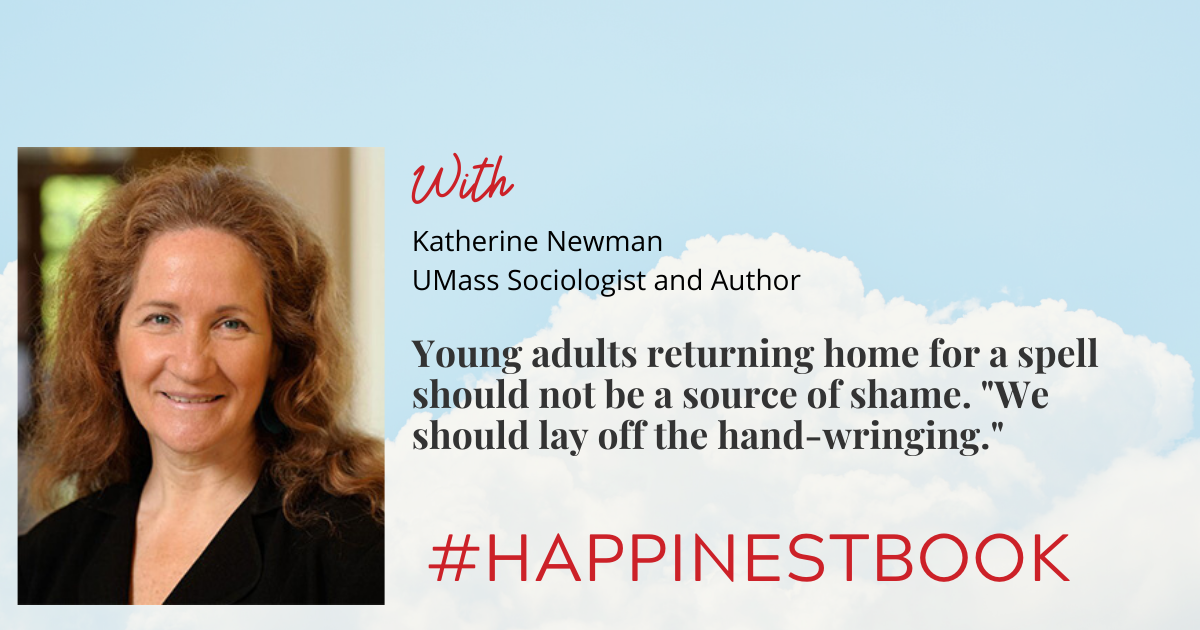Boomerang Kids Abound Because of Low Wages and The High Cost of Education and Housing
Katherine Newman is a professor of sociology at UMass and author of The Accordion Family: Boomerang Kids, Anxious Parents, and the Private Toll of Global Competition. She is the author of 15 books and has taught and run academic programs at many universities, including Harvard, Columbia, Berkeley and Johns Hopkins.
She has conducted research around the globe on boomerang kids—young adults who come back home to live with their parents for a spell. They are mockingly referred to as “failed fledglings” or “growing ups,”
But Katherine says parents should stop fretting and moralizing over young adults “lingering” in their parents’ home. She says today’s young adults are not slackers. The main culprit for the boomerang phenomenon has been low wages, which make it tough for young adults to earn the income they need to live independently. In addition, the skyrocketing cost of education and need for a bachelor’s degree and even a graduate degree to gain a firm foothold in our knowledge-based economy can be so expensive that young people can’t afford to live independently, she says.
Katherine says if young adults are engaging in behavior that will help them in the long run, such as studying, working and saving money, doing internships or a low-paid work experience that is a bridge to a career, then parents who support them “are making a rational, reasonable and honorable investment in the next generation.” The Boomerang phenomenon is a trend that appears here to stay.
Did you like this episode? Please share it with the social media buttons below. I’d love it if you would rate, review, and subscribe to HappiNest on Apple Podcast, Spotify, Stitcher or Google Play.
What you’ll learn about in this episode:
- “Families have always stepped up to help the next generation get where they want to go.”
- 24 million young adults are living home with their parents. In 2014, adults aged 18 to 34 were slightly more likely to be living with their parents than with a spouse or romantic partner.
- Southern European countries and Japan have a much higher proportion of young adults living with parents.
- In Sweden and in other Scandinavian social democracies, where higher education is free and there is a state-sponsored rental sector, Kids leave home at age 18 or earlier and study on state stipends in different cities. There are virtually no “accordion” families in strong welfare states like these.
- In Spain, Italy and Japan, where there is a weak welfare state and there is no real rental sector, the family home “becomes everyone’s savings account.” Jobs are not permanent or long-term and people are often hired on temporary assignments, so they can’t buy homes.
- In Italy, it’s traditional to live at home until you are married.
- The United States is in the middle when it comes to Boomerang kids. We have many rental properties, but staggering education costs. It’s not a “psychological crutch or lack of maturity” to live at home, but in most cases, it’s a necessity to move forward. “Preparing for the future becomes a valid reason for living at home.”
- In the United States, student loan debt is astronomical and the option for buying a home recedes into the background. Young adults are marrying and having children later, dynamics tied to a lack of economic opportunity.
- A helping hand from parents to children, later becomes a helping hand from children to parents.
- “It’s a different world… We should admire rather than castigate families for doing what they can—that is admirable.”
- Living at home for a spell should not be a source of shame or belittlement. “We should lay off the hand-wringing about whether or not we are coddling people.”





